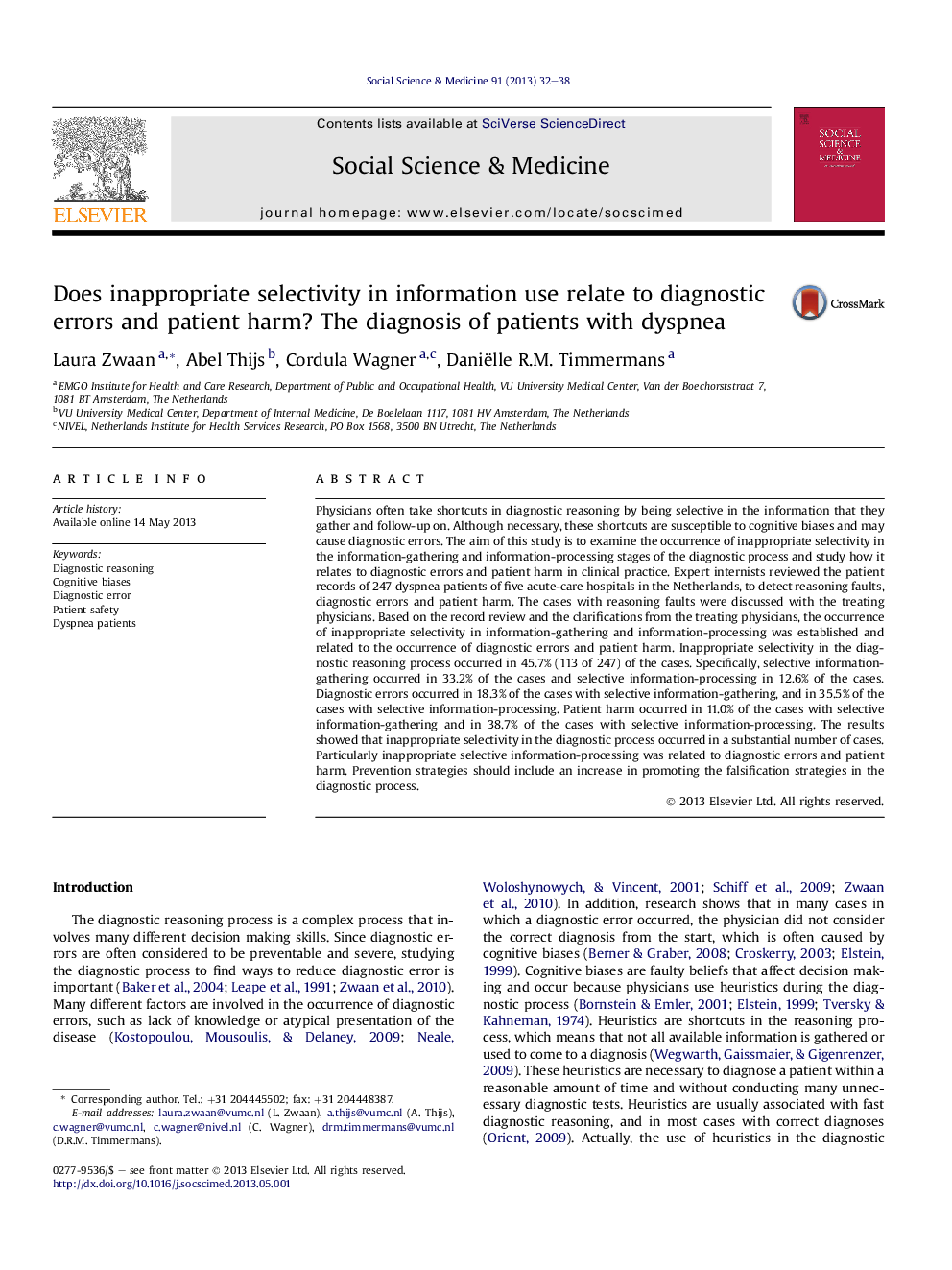| کد مقاله | کد نشریه | سال انتشار | مقاله انگلیسی | نسخه تمام متن |
|---|---|---|---|---|
| 7337098 | 1476077 | 2013 | 7 صفحه PDF | دانلود رایگان |
عنوان انگلیسی مقاله ISI
Does inappropriate selectivity in information use relate to diagnostic errors and patient harm? The diagnosis of patients with dyspnea
ترجمه فارسی عنوان
آیا انتخاب نامناسب در استفاده از اطلاعات مربوط به خطاهای تشخیصی و آسیب بیمار است؟ تشخیص بیماران مبتلا به تنگی نفس
دانلود مقاله + سفارش ترجمه
دانلود مقاله ISI انگلیسی
رایگان برای ایرانیان
کلمات کلیدی
استدلال تشخیصی، تعصب شناختی، خطای تشخیصی ایمنی بیمار، بیماران مبتلا به تنگی نفس،
ترجمه چکیده
پزشکان اغلب با استناد به اطلاعاتی که در آنها جمع آوری و پیگیری می شوند، میانجی گری در استدلال های تشخیصی می کنند. اگرچه لازم است، این میانبرها حساس به تعصب شناختی هستند و ممکن است خطاهای تشخیصی ایجاد کنند. هدف از این مطالعه بررسی وقوع انتخاب انتخاب نامناسب در مراحل جمع آوری اطلاعات و پردازش اطلاعات فرآیند تشخیصی و بررسی نحوه ارتباط آن با خطاهای تشخیصی و آسیب بیمار در عمل بالینی است. متخصصان داخلی، سوابق بیمار 247 بیمار مبتلا به انسداد را از 5 بیمارستان حاد مراقبت در هلند، برای شناسایی گسل های استدلال، خطاهای تشخیصی و آسیب بیمار بررسی کردند. موارد با گسل های استدلال با پزشکان درمان شده مورد بحث قرار گرفت. بر اساس بررسی رکورد و توضیحات پزشکان درمانی، انتخاب انتخاب نامناسب در جمع آوری اطلاعات و پردازش اطلاعات ایجاد شده و با وقوع خطاهای تشخیصی و آسیب بیمار ایجاد شده است. انتخاب انتخاب نامناسب در روند استدلال تشخیصی در٪ 45.7 (113 از 247) موارد رخ داده است. به طور خاص، جمع آوری اطلاعات انتخابی در 33.2٪ موارد و پردازش اطلاعات انتخابی در 12.6٪ موارد صورت گرفت. خطاهای تشخیصی در 3/18٪ موارد با جمع آوری اطلاعات انتخابی و در 35.5٪ موارد با پردازش اطلاعات انتخابی رخ داده است. آسیب بیمار در 11.0٪ موارد با جمع آوری اطلاعات انتخابی و در 38.7٪ موارد با پردازش اطلاعات انتخابی رخ داده است. نتایج نشان داد که انتخاب انتخاب نامناسب در روند تشخیصی در تعداد قابل توجهی از موارد رخ داده است. پردازش اطلاعات انتخابی خصوصا نامناسب مربوط به خطاهای تشخیصی و آسیب بیمار بود. استراتژی های پیشگیری باید شامل افزایش ترویج استراتژی های دروغین در روند تشخیصی شوند.
موضوعات مرتبط
علوم پزشکی و سلامت
پزشکی و دندانپزشکی
سیاست های بهداشت و سلامت عمومی
چکیده انگلیسی
Physicians often take shortcuts in diagnostic reasoning by being selective in the information that they gather and follow-up on. Although necessary, these shortcuts are susceptible to cognitive biases and may cause diagnostic errors. The aim of this study is to examine the occurrence of inappropriate selectivity in the information-gathering and information-processing stages of the diagnostic process and study how it relates to diagnostic errors and patient harm in clinical practice. Expert internists reviewed the patient records of 247 dyspnea patients of five acute-care hospitals in the Netherlands, to detect reasoning faults, diagnostic errors and patient harm. The cases with reasoning faults were discussed with the treating physicians. Based on the record review and the clarifications from the treating physicians, the occurrence of inappropriate selectivity in information-gathering and information-processing was established and related to the occurrence of diagnostic errors and patient harm. Inappropriate selectivity in the diagnostic reasoning process occurred in 45.7% (113 of 247) of the cases. Specifically, selective information-gathering occurred in 33.2% of the cases and selective information-processing in 12.6% of the cases. Diagnostic errors occurred in 18.3% of the cases with selective information-gathering, and in 35.5% of the cases with selective information-processing. Patient harm occurred in 11.0% of the cases with selective information-gathering and in 38.7% of the cases with selective information-processing. The results showed that inappropriate selectivity in the diagnostic process occurred in a substantial number of cases. Particularly inappropriate selective information-processing was related to diagnostic errors and patient harm. Prevention strategies should include an increase in promoting the falsification strategies in the diagnostic process.
ناشر
Database: Elsevier - ScienceDirect (ساینس دایرکت)
Journal: Social Science & Medicine - Volume 91, August 2013, Pages 32-38
Journal: Social Science & Medicine - Volume 91, August 2013, Pages 32-38
نویسندگان
Laura Zwaan, Abel Thijs, Cordula Wagner, Daniëlle R.M. Timmermans,
